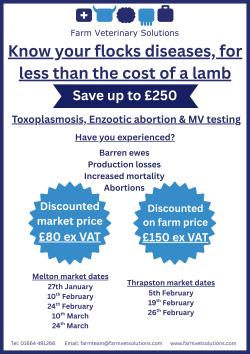
Cull ewe testing
posted on Thu, 15 Jan 2026
We are testing your cull ewes at Melton and Thrapston markets. The testing is £80, which saves you up to £250.
Melton market dates
27th January
10th February
24th February
10th March
24th March
Thrapston market dates
5th February
19th...
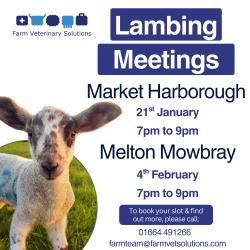
Lambing meetings
posted on Mon, 12 Jan 2026
We are pleased to invite you to our Annual Lambing Meeting, taking place on the following dates and locations:
Market Harborough
21 January | 7:00pm – 9:00pm
Melton Mowbray
4 February | 7:00pm – 9:00pm
Refreshments will be provided.
If you would like to attend, please contact us on 01664 491266 or email [email protected] to confirm your place.
We kindly ask that you inform us of any dietary requirements when...
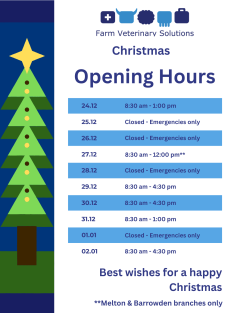
Christmas period opening hours
posted on Tue, 16 Dec 2025
As we move into the festive period, please keep in mind our Christmas office hours for collections, orders and booking appointments.
Our emergency vets are still here 24/7 — call 01664 491266 if your animal needs urgent care....
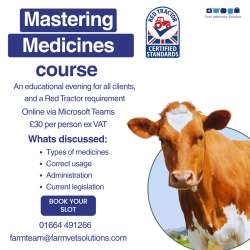
Mastering Medicines course
posted on Mon, 20 Oct 2025
Mastering Medicines Course
The meeting will be held online via Microsoft Teams, in collaboration with Norbrook
Date: 17th November
Time: 7:00 PM (Online)
Cost: £30...
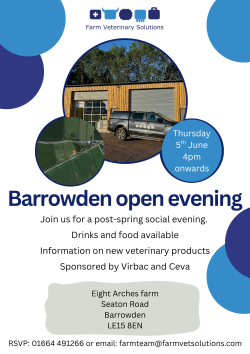
Barrowden Social event
posted on Wed, 28 May 2025
Dear valued clients of FVS,
We would love for you to join us for a client social evening on Thursday 5th June, at the new FVS Barrowden practice, Eight Arches Farm, LE15 8EN.
We'll be hosting a BBQ and drinks for staff and clients from 4pm until late! There have been a few changes to the business, staff, and sites recently so we would be delighted to welcome you for a post-spring social catch up!
If you or any guests would like...
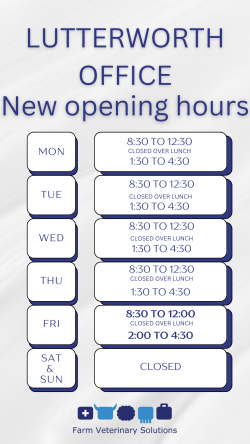
Lutterworth office opening hours
posted on Fri, 14 Mar 2025
We have adjusted our Lutterworth office opening hours on Fridays. Please consider this when visiting our Lutterworth office.
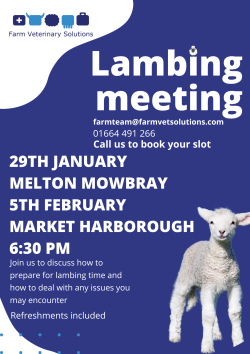
Lambing meetings
posted on Wed, 15 Jan 2025
Join our FVS team for a discussion on lambing. Our meetings are running on the 29th of January in Melton Mowbray and the 5th of February at Market Harborough.
To get more information or to book your place, please call our office on 01664 491266.
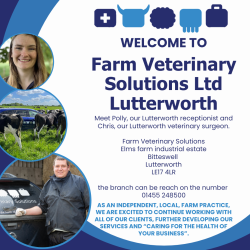
Farm Vet Solutions, Lutterworth
posted on Wed, 15 Jan 2025
Chris and Polly are based at our Lutterworth branch.
Here you can order and collect drugs, test faecal egg counts, book appointments, and any other farm veterinary needs.
The contact number for Lutterworth Farm Vet Solutions is: 01455 248500, or you can simply email: [email protected], for any queries.
For emergencies please contact 01664 491266.

2024 Christmas opening hours
posted on Wed, 18 Dec 2024
Please review our opening hours during the Christmas period. We will resume normal hours on January 2nd, 2025. While the office may be closed, our emergency vets will still be available if needed.
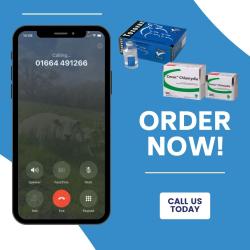
Reminder: Toxovax Orders
posted on Wed, 12 Jun 2024
Thankfully, the 2024 supply for the toxoplasmosis vaccine is looking promising! That being said, we can never guarantee reliable supply and so we recommend placing your orders as soon as possible.
Key Points to Remember:
¨ Toxovax has a very short shelf-life of around 7-10 days.
¨ Orders must be placed in advance with a planned dispatch date to work with your schedule.
¨ Vaccines can be purchased in batches. You don’t need to commit to vaccinating all of your ewes in one go. This is especially beneficial for those who are unsure on how many replacements will be...

